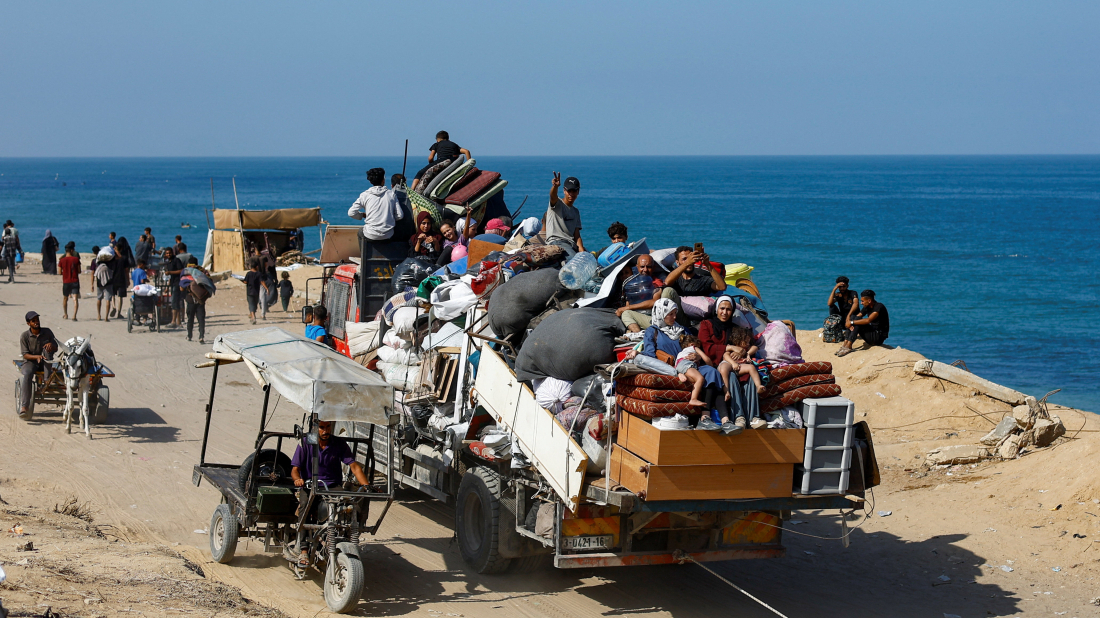'We will increase the volume of natural gas exports to Serbia,' Aliyev says
Azerbaijani President Ilham Aliyev and Serbian President Aleksandar Vučić reaffirmed their countries’ strategic partnership in Belgrade on Sunday ...

The Israeli military said on Wednesday it was opening an additional route for 48 hours that Palestinians could use to leave Gaza City as it stepped up efforts to empty the area of civilians and confront thousands of Hamas troops.
Hundreds of thousands of people are sheltering in the city and many are reluctant to follow Israel's orders to move south because, they say, the dangers along the way, the dire conditions, a lack of food in the southern area, and fear of permanent displacement.
"Even if we want to leave Gaza City, is there any guarantee we would be able to come back? Will the war ever end? That's why I prefer to die here, in Sabra, my neighbourhood," Ahmed, a school teacher, said by phone.
At least 30 people were killed across the Strip on Wednesday in Israel's latest strikes, including 19 in Gaza City, local health authorities said.
A day after Israel announced the launch of a ground offensive to seize control of the main urban centre, tanks had moved short distances towards the city's central and western areas from three directions, but no major advance was reported.
An Israeli official said military operations were focused on getting civilians to head south and that fighting would intensify over the next month or two.
The official said Israel expected around 100,000 civilians to remain in the city, which would take months to capture, and the operation could be suspended if a ceasefire was reached with the Hamas militant group.
The prospects of a ceasefire appear remote after Israel attacked Hamas' political leaders in Doha last week, infuriating Qatar, a co-mediator in ceasefire talks.
Despite global criticism of the attack, include criticism from an ally U.S., Prime Minister Benjamin Netanyahu has said Israel will strike Hamas "wherever they are."
U.S. Secretary of State Marco Rubio during his Doha visit said there was "a very short window of time" in which a ceasefire could happen, potentially referring to Israel's statements about stopping Hamas by force.
Meanwhile, the diplomatic response continues to evolve within the European Union. On Wednesday, the European Commission proposed suspending free-trade arrangements for Israeli goods due to the war. However, the measure currently lacks sufficient support among bloc members to pass.
EU Foreign Policy Chief Kaja Kallas also proposed a package of sanctions targeting two Israeli ministers, violent settlers, and Hamas members.
It's reported that Netanyahu has said these EU sanctions "won't have much effect."
U.S. Ambassador to NATO Matthew Whitaker said China has the power to bring an end to Russia’s war in Ukraine, arguing that Beijing is enabling Moscow’s military campaign.
American figure skating star Ilia Malinin endured a dramatic collapse in the men’s free skate on Friday night, falling twice and tumbling out of medal contention at the Milan Cortina Winter Olympics as Kazakhstan’s Mikhail Shaidorov surged to a surprise gold medal.
“Respected and feared globally,” U.S. President Donald Trump told troops at Fort Bragg on Friday (13 February), framing America’s renewed strength against to mounting pressure on Iran amid stalled nuclear talks.
Speaking at Munich Security Conference, Ukrainian foreign minister Andrii Sybiha calls for decisive steps ahead of expected Geneva talks
Thousands of fans packed River Plate’s Monumental Stadium in Buenos Aires on Friday for the first of three sold-out concerts by Puerto Rican reggaeton star Bad Bunny, as part of his “Debí Tirar Más Fotos” World Tour.
U.S. Secretary of State Marco Rubio on Sunday (15 February) called it “troubling” a report by five European allies blaming Russia for killing late Kremlin critic Alexei Navalny using a toxin from poison dart frogs.
Former U.S. President Barack Obama has criticised a video shared by President Donald Trump depicting him and former first lady Michelle Obama as apes, describing it as “deeply troubling”.
U.S. Secretary of State Marco Rubio will begin a two-day visit to Slovakia and Hungary on Sunday (15 February), aimed at strengthening ties with the two Central European nations, whose leaders have maintained close relations with President Donald Trump.
The Munich Security Conference concludes on Sunday (15 February) with discussions centred on Europe’s role in an increasingly unstable global landscape, including security coordination, economic competitiveness and the protection of democratic values.
Start your day informed with AnewZ Morning Brief: here are the top news stories for the 15th of February, covering the latest developments you need to know.
You can download the AnewZ application from Play Store and the App Store.

What is your opinion on this topic?
Leave the first comment